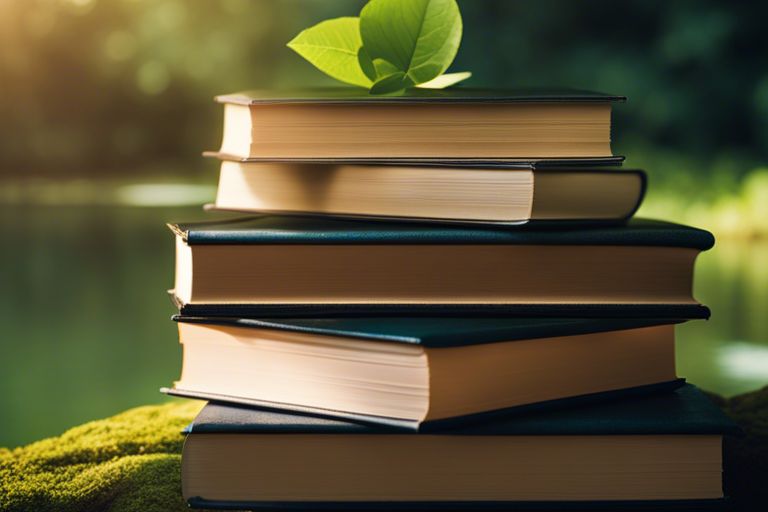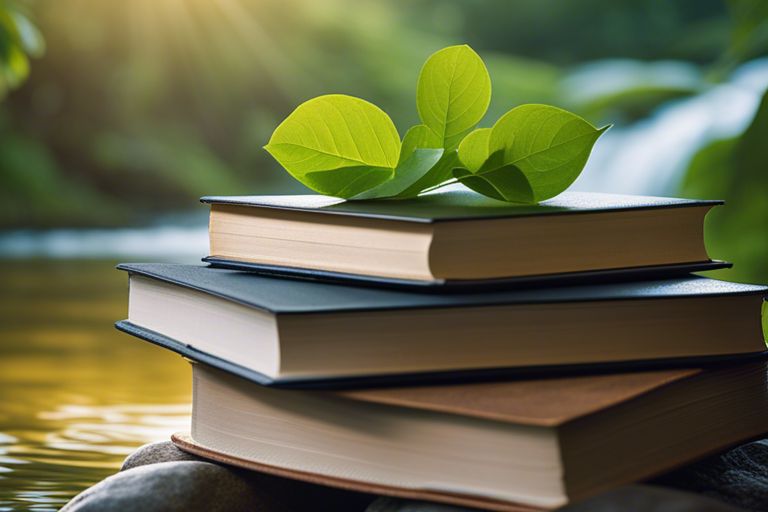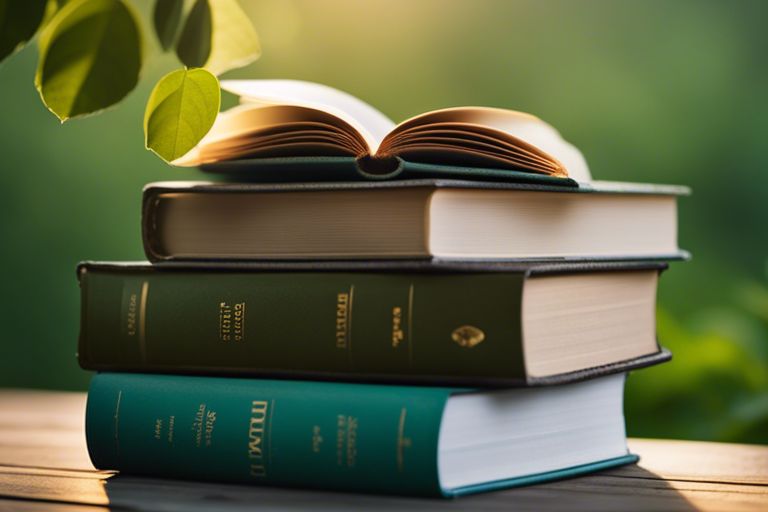This comprehensive list is curated to help you discover the best books on meditation and mindfulness that will guide you on your journey to inner peace and self-discovery. Whether you are a beginner looking to explore the world of meditation or a seasoned practitioner seeking to deepen your practice, these books offer valuable insights and practical techniques to incorporate mindfulness into your daily life.
Key Takeaways:
- Explore various meditation techniques: The best books on meditation and mindfulness provide a comprehensive exploration of different meditation practices, allowing you to find the technique that resonates with you the most.
- Understand the science behind meditation: These books often investigate into the scientific research that supports the benefits of meditation, helping you appreciate the physiological and psychological effects of a regular practice.
- Learn how to cultivate mindfulness in everyday life: These books offer practical advice on integrating mindfulness into your daily routine, enabling you to bring a sense of presence and awareness to all aspects of your life.
- Gain insights into the philosophy of mindfulness: Many of these books explore the philosophical underpinnings of mindfulness, providing a deeper understanding of its roots in ancient traditions and its relevance in the modern world.
- Find inspiration and motivation to sustain your practice: Reading about the experiences of seasoned meditation practitioners and the transformative effects of mindfulness can inspire and motivate you to continue your own journey towards inner peace and well-being.
The Foundations of Meditation
One of the key aspects of starting a meditation practice is understanding the foundational principles that guide this ancient practice. From the history of meditation to the various techniques used, having a grasp of the basics is essential for a meaningful meditation experience.
Understanding Meditation: History and Practices
Understanding the roots of meditation can provide insight into why this practice has endured for centuries. From its origins in ancient Eastern philosophies to its integration into Western culture, meditation has evolved into a wide range of practices aimed at cultivating inner peace, focus, and emotional well-being. Techniques such as mindfulness meditation, loving-kindness meditation, and transcendental meditation each offer unique approaches to achieving a meditative state.
As practitioners probe deeper into the world of meditation, they may encounter various methods and traditions that suit their individual needs and preferences. From guided meditation to silent meditation, the diversity of practices allows for flexibility in incorporating meditation into one’s daily routine.
Mindfulness Explained
The concept of mindfulness is central to many meditation practices and involves maintaining a moment-by-moment awareness of thoughts, feelings, bodily sensations, and the surrounding environment. By cultivating mindfulness, individuals can learn to observe their inner experiences without judgment, allowing for greater clarity and emotional regulation.
Plus, mindfulness extends beyond formal meditation sessions and can be integrated into everyday activities such as eating, walking, and interacting with others. This practice of mindfulness in daily life helps individuals stay present and engaged in each moment, fostering a sense of connection and mindfulness in all aspects of life.
Starting Your Journey
Some people begin their meditation and mindfulness journey with the help of a good book. There are numerous resources available that can guide beginners through the process of understanding and practicing these techniques. Whether you are new to meditation and mindfulness or looking to deepen your existing practice, the right book can provide valuable insights and techniques to support your journey.
Books for Beginners
Starting your meditation and mindfulness journey can be both exciting and overwhelming. It’s essential to find resources that simplify these practices and provide step-by-step guidance for beginners. Books like “The Power of Now” by Eckhart Tolle and “Wherever You Go, There You Are” by Jon Kabat-Zinn are excellent starting points for those new to meditation and mindfulness. These books offer practical advice, simple exercises, and profound insights to help beginners establish a strong foundation for their practice.
Establishing a Daily Practice
Starting a daily meditation and mindfulness practice is key to experiencing the transformative benefits of these techniques. Books such as “The Miracle of Mindfulness” by Thich Nhat Hanh and “10% Happier” by Dan Harris provide practical tips on how to integrate meditation and mindfulness into your daily routine. These resources offer guidance on overcoming common obstacles, staying motivated, and cultivating a consistent practice that can positively impact your well-being.
A daily meditation practice can help reduce stress, increase focus, and cultivate a sense of inner peace. By setting aside a few minutes each day to meditate, you can gradually build resilience, self-awareness, and emotional regulation. Consistency is key when establishing a daily practice, and books can be valuable tools in helping you stay committed to your meditation and mindfulness journey.
Deepening Your Practice
Not just for beginners, deepening your meditation practice can lead to profound insights and transformation. As you progress on your mindfulness journey, it becomes important to explore advanced meditation techniques and integrate mindfulness into your daily life.
Advanced Meditation Techniques
Deepening your meditation practice involves exploring advanced techniques that can help you cultivate a deeper sense of awareness and connection. Here are some advanced meditation techniques to consider:
- Visualization: Using the power of visualization to focus the mind and manifest positive outcomes.
- Mantra Meditation: Repetition of sacred sounds or words to quiet the mind and deepen concentration.
- Body Scan: Bringing awareness to each part of the body to release tension and promote relaxation.
- Loving-Kindness Meditation: Cultivating compassion and empathy towards oneself and others through meditation.
Mindfulness in Daily Life
With mindfulness practice, the goal is to not only meditate on the cushion but to bring that sense of awareness into everyday activities. Mindfulness in daily life can help you stay present, reduce stress, and enhance the quality of your interactions.
Practice incorporating mindfulness into routine tasks such as eating, walking, or even washing dishes. By bringing full attention to these activities, you can experience a deeper sense of connection to the present moment and cultivate a greater sense of gratitude and clarity in your daily life.
Meditation for Specific Goals
Stress Reduction and Anxiety Relief
Keep calm and meditate! When it comes to managing stress and anxiety, meditation has been proven time and again as an effective tool. Books like “The Mindful Way Through Anxiety” by Susan M. Orsillo and Lizabeth Roemer and “Wherever You Go, There You Are” by Jon Kabat-Zinn offer practical guidance on using meditation techniques to alleviate the symptoms of stress and anxiety. These books provide valuable insights and exercises that can help individuals cultivate a sense of inner peace and resilience.
An important aspect of meditation for stress reduction and anxiety relief is learning to focus on the present moment and let go of worries about the past or future. By practicing mindfulness and meditation regularly, individuals can develop the skills to better cope with stressful situations and manage anxiety triggers effectively.
Enhancing Creativity and Focus
Meditation is not only beneficial for reducing stress but also for enhancing creativity and focus. Books like “The Artist’s Way” by Julia Cameron and “Mindfulness for Creativity” by Dr. Danny Penman offer valuable insights and techniques for unlocking creativity through mindfulness practices. These books provide exercises and tips for developing a focused and clear mind, essential for creative endeavors.
Enhancing creativity and focus through meditation involves training the mind to be fully present and attentive. By practicing meditation regularly, individuals can improve their ability to concentrate, think creatively, and access new ideas. Meditation can help individuals tap into their creative potential and overcome mental blocks that may hinder productivity.
Meditation is a powerful tool for enhancing creativity and focus by quieting the mind and fostering a deep sense of awareness. Regular practice of meditation can lead to increased cognitive flexibility, improved concentration, and heightened inspiration. By incorporating meditation into your daily routine, you can cultivate a creative mindset and improve your ability to stay focused on tasks at hand.
Stress reduction and anxiety relief are just a few of the many benefits that meditation can offer. By learning how to meditate effectively, individuals can not only improve their mental well-being but also enhance their creativity, focus, and overall quality of life. Whether you are looking to manage stress, boost creativity, or simply find inner peace, meditation can be a valuable tool in achieving your goals.
Mindfulness and Physical Health
To truly understand the profound impact of mindfulness on physical health, we need to explore the mind-body connections that play a crucial role in overall well-being.
Mind-Body Connections
Health is not just the absence of disease; it encompasses a holistic view of the body and mind working in harmony. Mindfulness practices such as meditation help cultivate an awareness of these mind-body connections, allowing individuals to tap into the body’s natural ability to heal and thrive.
Studies have shown that practicing mindfulness can lower stress levels, improve cardiovascular health, and boost the immune system. By being present in the moment and observing thoughts without judgment, individuals can reduce inflammation and promote overall physical well-being.
Meditation for Pain Management
Health professionals are increasingly turning to meditation as a complementary approach to managing chronic pain. Mindfulness meditation has been found to alleviate pain by changing the way the brain perceives and responds to discomfort.
Research suggests that regular meditation practice can effectively reduce the intensity of pain, improve physical function, and enhance quality of life for individuals dealing with various chronic pain conditions.
This makes meditation a valuable tool for those seeking alternative ways to address pain and improve their overall quality of life without relying solely on medication.
Spiritual Perspectives in Meditation
Your journey into meditation and mindfulness practice may explore various spiritual perspectives that have long embraced these techniques for inner peace and self-discovery. Understanding the spiritual roots of meditation can deepen your practice and offer different insights into the mind-body connection.
Meditation in Various Spiritual Traditions
To truly grasp the essence of meditation, it is essential to recognize its integral role in diverse spiritual traditions. From the ancient practices of Hinduism and Buddhism to the contemplative practices of Christianity and Sufism, meditation has been used as a tool to cultivate inner awareness, connect with the divine, and attain spiritual enlightenment. Each tradition brings its unique approach to meditation, emphasizing different aspects such as mindfulness, prayer, or mantra repetition.
Exploring the spiritual perspectives in meditation can enrich your understanding of the practice and offer a broader perspective on the human quest for higher consciousness and inner peace. By delving into the wisdom of various spiritual traditions, you can gain valuable insights into the universal principles that underlie meditation and mindfulness practices.
Secular Meditation Practices
To cater to a broader audience seeking mental well-being and stress relief, secular meditation practices have emerged as effective tools for cultivating mindfulness and inner calm. These practices, derived from traditional meditation techniques but devoid of religious or spiritual elements, offer a practical approach to harnessing the benefits of meditation without any specific belief system.
Beyond spiritual affiliations, secular meditation practices focus on the scientific benefits of mindfulness, such as improved emotional regulation, increased focus, and reduced anxiety. These practices have gained popularity in therapeutic settings, corporate environments, and educational institutions, making meditation accessible to individuals from all walks of life.
Buddhist meditation techniques, such as mindfulness and loving-kindness meditation, have been widely adopted in secular settings, showcasing the universal appeal and effectiveness of these age-old practices in promoting mental well-being and emotional resilience.
Resources and Continuing Your Education
Unlike traditional education, learning about meditation and mindfulness is a lifelong journey that requires continual practice and exploration. Fortunately, there is a plethora of resources available to aid you in deepening your understanding and enhancing your practice.
Guided Meditations and Audio Resources
With the rise of technology, accessing guided meditations and audio resources has never been easier. Platforms like Calm, Insight Timer, and Headspace offer a wide range of guided meditation sessions led by experienced mindfulness teachers. These resources provide support for both beginners and seasoned practitioners, offering a variety of meditation styles and topics to explore.
Listening to guided meditations can help you establish a regular meditation routine, deepen your practice, and cultivate specific qualities like compassion and gratitude. Additionally, audio resources can be a valuable tool for managing stress, anxiety, and improving overall well-being.
Retreats and Workshops
For those seeking a more immersive experience, retreats and workshops provide an opportunity to deepen your meditation practice and connect with like-minded individuals. Retreat centers around the world offer silent meditation retreats, mindfulness workshops, and specialized programs led by experienced teachers.
Attending a retreat or workshop can provide a dedicated space for self-reflection, inner exploration, and personal growth. These experiences often include guidance from meditation teachers, group discussions, and opportunities to develop a deeper understanding of mindfulness practices.
For those interested in exploring retreats and workshops, it is essential to research and choose programs that align with your goals and experience level. Whether you opt for a weekend retreat or a longer residential program, these immersive experiences can offer profound insights and transformative effects on your meditation and mindfulness journey.
Summing up
Upon reflecting on the best books on meditation and mindfulness, it is clear that these resources provide valuable insights and guidance for individuals seeking to cultivate a more mindful and peaceful way of living. Whether you are a beginner looking to start your meditation journey or a seasoned practitioner looking to deepen your practice, these books offer practical tips, exercises, and wisdom to support you along the way.
By incorporating the teachings and practices outlined in these books into your daily life, you can tap into the transformative power of meditation and mindfulness to reduce stress, increase self-awareness, and foster a greater sense of well-being. Ultimately, these books serve as powerful tools to help you cultivate a deeper connection with yourself and the world around you, leading to a more balanced and harmonious way of being.




